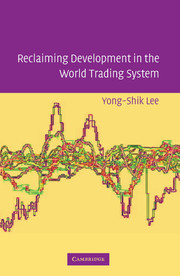Book contents
- Frontmatter
- Contents
- List of Abbreviations
- Acknowledgments
- 1 Poverty, Economic Development, and International Trade
- 2 Current Regulatory Framework for International Trade: The WTO System
- 3 Reclaiming Development: Tariff Bindings and Subsidies
- 4 Anti-Dumping and Safeguards
- 5 “Expansion” of Trade Disciplines and Development
- 6 Foreign Direct Investment and Regional Trade Liberalization
- 7 Conclusion: Putting Back the Ladder
- Epilogue
- Bibliography
- Index
1 - Poverty, Economic Development, and International Trade
Published online by Cambridge University Press: 18 August 2009
- Frontmatter
- Contents
- List of Abbreviations
- Acknowledgments
- 1 Poverty, Economic Development, and International Trade
- 2 Current Regulatory Framework for International Trade: The WTO System
- 3 Reclaiming Development: Tariff Bindings and Subsidies
- 4 Anti-Dumping and Safeguards
- 5 “Expansion” of Trade Disciplines and Development
- 6 Foreign Direct Investment and Regional Trade Liberalization
- 7 Conclusion: Putting Back the Ladder
- Epilogue
- Bibliography
- Index
Summary
The Question of Poverty
In today's world of unprecedented technological and economic advances, the majority of the world population has not been able to share in this prosperity. Persistent poverty still remains in many parts of the world, and this human tragedy is one of the most pressing problems in our time. Nevertheless, despite some efforts by international organizations, poverty does not seem to receive priority consideration from leading nations that could provide key political and economic support toward resolving this problem. Consider this issue from another perspective: not only is the relief of persistent poverty our moral obligation but it is also consistent with our long-term security interest because societies with adequate economic resources are less likely to foster violence and terrorism that has torn our world apart throughout history.
How can this problem of poverty be resolved? Poor countries cannot indefinitely depend on donations from outside, even if such donations could be provided; the only lasting solution would be to create an economy in these countries through economic development that would provide inhabitants with adequate resources and sustain their living standard beyond subsistence. How can poor nations build such an economy? It has been suggested that poverty is not simply a result of bad economic policy; various political, social, and even cultural problems have also been cited as causes of poverty. Because these causes are rather various and complex, many believe that no simple solution to poverty is universally applicable.
- Type
- Chapter
- Information
- Reclaiming Development in the World Trading System , pp. 1 - 13Publisher: Cambridge University PressPrint publication year: 2006



